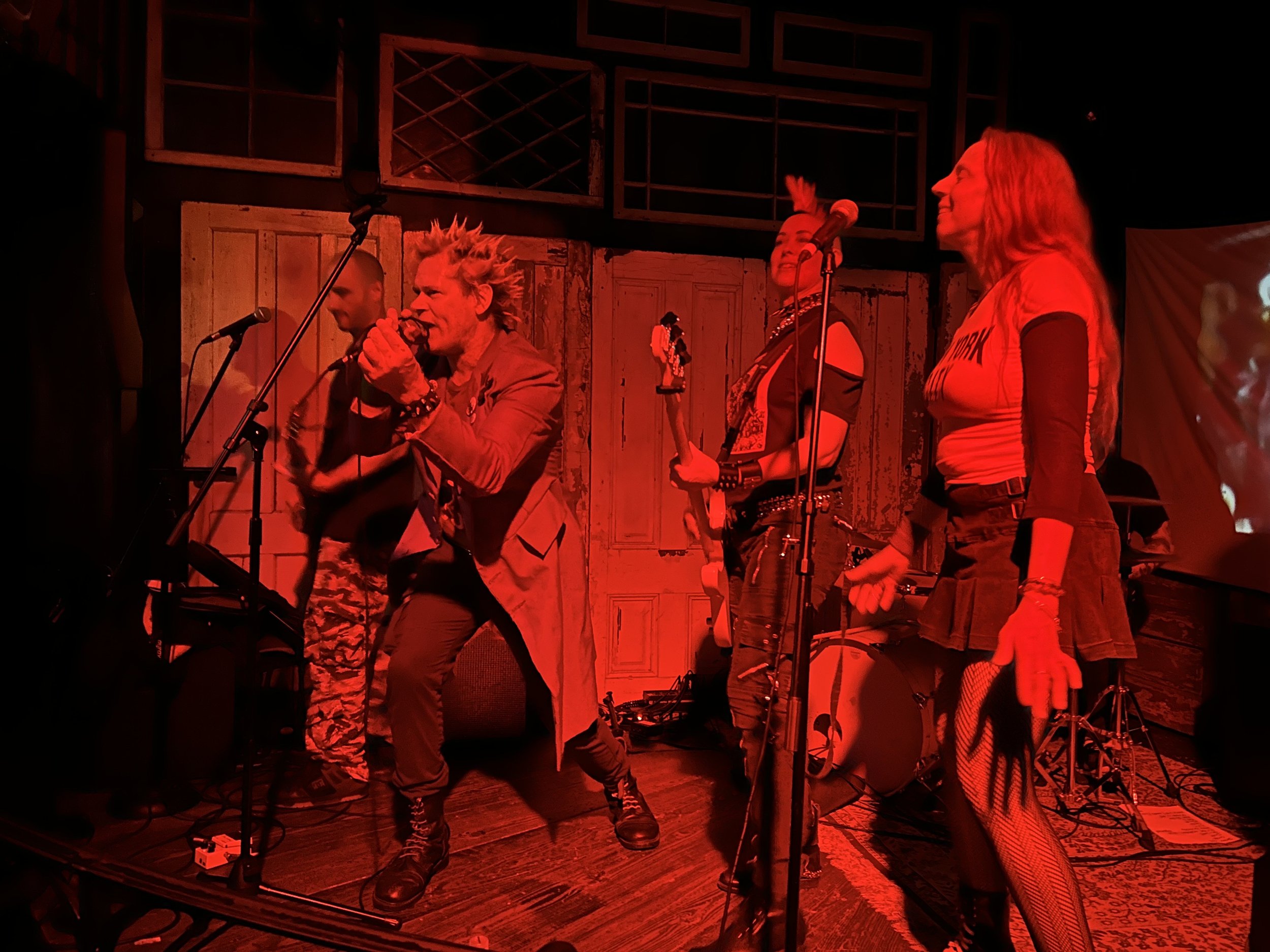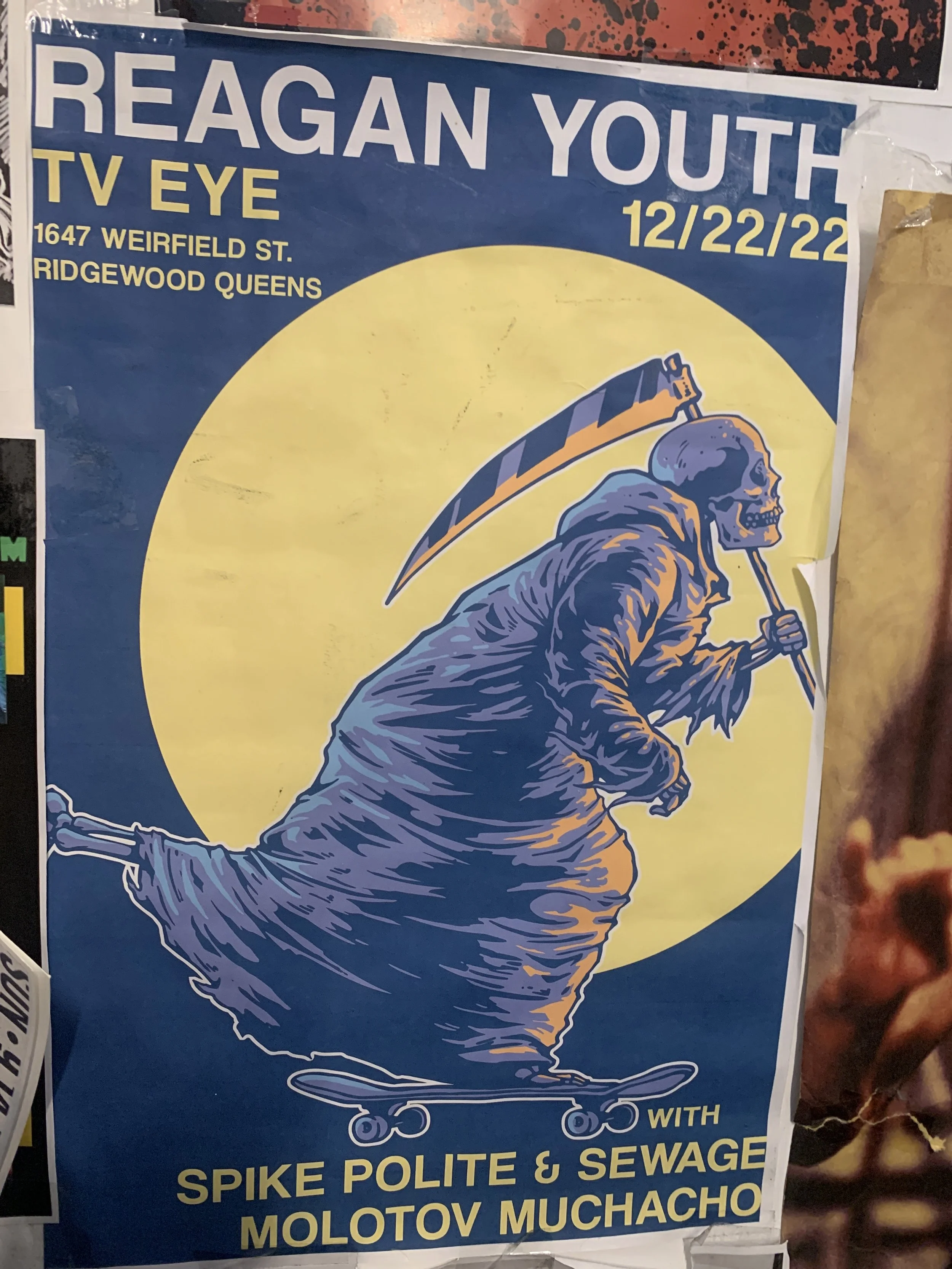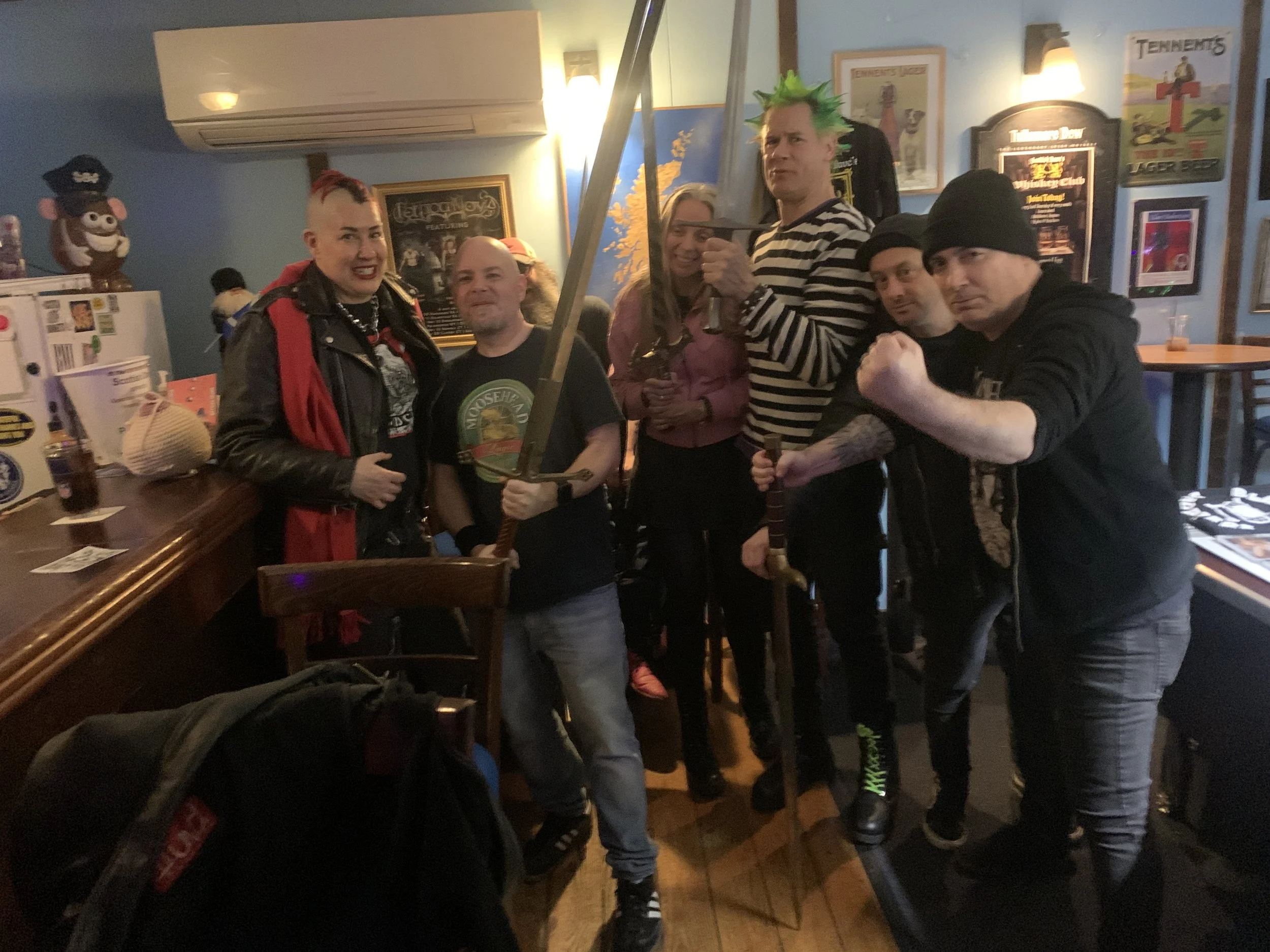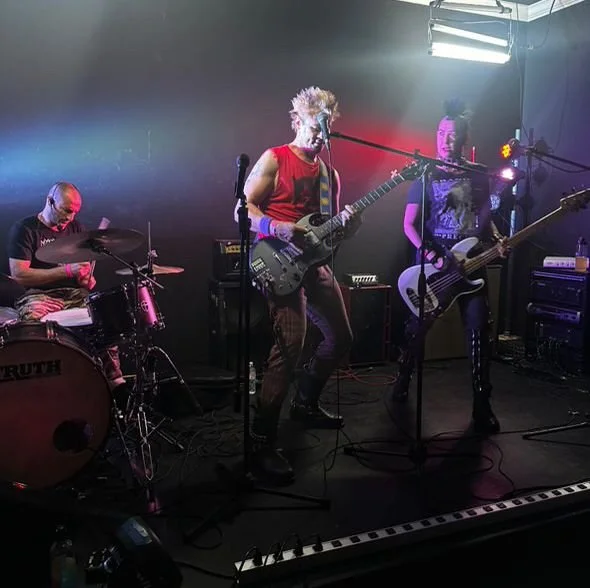Not For Corporate Radio: NYC's Spike Polite and SewAge
By Raph Copeland | September 13, 2025
Spike Polite and SewAge is never going to be invited to play the Super Bowl Halftime Show. But if they ever did, a few corporate sponsors might end up not too happy.
This is a band that doesn’t just sing about the things they believe in - they live it. They don’t just talk about what’s wrong with society right now - they are doing something about it. This isn’t a band that is just saying “fuck the system” and leaving it at that, they’re saying “this isn’t right. What are we going to do about it?” From human rights to mutual aid to housing equity to police brutality, Spike Polite and SewAge is stepping up and saying “we’re not rolling over for you, whoever you are”. This is a band that throws a lot at you, but the word “compromise” is not in their vocabulary.
Featuring underground veterans Spike Polite on lead guitar and vocals, Anthony Romano on drums and guitar, Michelle Shocked and Heide Miklitz on bass, and Johnny Arkansas on drums, the band has carved out a niche in the NYC underground punk scene that is hard to ignore. As a label founded expressly on anarchist and socialist principles, we were very excited to hear what they had to say.
Thanks for stopping by! Tell us about your latest release.
Our latest album, an EP titled "Officer Munn", was released on CD and also digitally with a few differences. The concept behind the release is a punk rock Halloween. The theme track "Officer Munn" describes a typical evening under an oppressive government regime that punished citizens to appease the uber wealthy 1% under the guise of "quality of life". Police hiding in bushes jumping out at punks is a scare to the 40 ounce bottle wielding street punk on the crusty row of Tompkins Square Park. Lurch, you bastard! The music is Halloween themed as Officer Munn was a 7 foot something tall ghoulish character seeking open containers of cheer to send one downtown in handcuffs to be served d.a.t. fines for the City of New York.
What's the story behind your band name?
Sewage was themed after the fact that society had rejected us. The system was broken as witnessed through the police brutality accompanied by a snobbish, condescending demeanor of the bed bug yuppie types who refused to assimilate into the lower east side and instead forced out artists and locals by raising the rent and gentrifying the neighborhood. They considered us skum, as rejects not destined to make it. Being gutter punks living in squats through the graces of hippies who ran counterculture movements, we firmly believed that we were not skum but the voice for the oppressed. We regularly participated in protests and community activists meetings, such as those held at the 13th Street Squat in defense of human rights and marijuana legalization rallies and concerts. We fought against social injustices committed by members of law enforcement along with underhanded politicians who sold out the community to high income realty estate developers instead of representing those who voted them in. (Visit M.O.R.U.S for more information and history.) We would rise up, not be crushed! We organized concerts with bands singing only protest lyrics. We are in NYC, like in movies such as Alligator, Escape from New York, and C.H.U.D. The sewer lid is our logo. We imagined that a punk rock alligator is rising up from the depths of the storm drain system along with a couple of cannibalistic humanoid underground dwellers to chomp down on the inconsiderate trust funded transplants who are gentrifying the city and neglecting to respect wildlife i.e. us! We demanded: “The right to affordable rent is ours. Stop gentrification!”
How did the band originally form?
The band was formed on the benches of crusty row in Tompkins Square Park after witnessing police brutality of which a riot ensued; that happened to be covered by the New York Newsweek (Queens/Manhattan newspaper) featuring Spike Polite front and center in a three page article at the car bonfire on Avenue A poised with bottle in hand set to launch it at the barrage of police in riot gear rows deep before him. The members were writing the song together in central booking as a protest song. That track is titled "Police Brutality" which can be found on the Pandemonium ep. We got our start at the 13th Street Squat due to jazz musicians who liked us for being involved in the '91 riot, so they let us put on shows at their space. Soon the yippies who ran pot parade marches and concerts were booking us on big show bills organized by High Times Magazine and Cannabis Cup Tours. Eventually the band broke into CBGB and Jessie Malin's venue Coney Island High, also often performing at Continental Divide for Joey Ramone's Birthday Bash run from George Tabb of New York Press rock music newspaper. SewAge was in a television commercial that aired in 1999 for the Spike Lee movie "Summer of Sam" and aired on E Tv behind the scenes with Howard Stern who covered the production.
How would you describe your sound?
The sounds of SewAge nyc are classic punk towards thrash punk at times. Melodic singing of humorous topics such as "Subway Surfing" and anthemic, sing along choruses of "Stop Police Brutality!" are some of the subject content Spike sings about over his distorted guitar and Michelle Shocked's crunch bass notes in downpicking Ramones-esque style to powerful upbeat drumming. Everyone dances in the SewAge so to speah; the music is catchy and danceable... and there are still some tracks one can slam dance to, but we prefer to pogo!
Who are your biggest musical influences, both as a band and individually, and why?
Our biggest musical influences are: The Ramones for their driving three chord fast tempo and introducing that genre of music to the rest of the world. The Clash for political messages. The Plasmatics for raw energy and showmanship
What has been the most memorable moment of your career so far?
Our most memorable experience was opening for GG Allin at the Gas Station in New York City’s lower east side. He was insisting that he use our equipment to make a video before the concert occurred. He was pushy and the promoters persuaded us to allow that, despite our opposition to him potentially destroying and defiling our gear via his defecation antics. Still, I was able to enjoy the night because in addition to having to perform, it was also fun watching the people run avoiding the poop that he was throwing at them. After the show, he died directly across the street and his death made the newspapers the next day.
What bands would you consider influences?
Bands that are influential to us: Black Flag, Circle Jerks, and SST Records for their persistence in touring using the underground, grassroots, do-it-yourself network when regular main stream radio disliked and refused to play punk. The Grateful Dead are a good influence also as they did their own thing as well. They allowed their fans to copy their music, to record each concert, and pass it along to friends, as it allows them to gain more of an audience through building a community. Those audio recording fans may not have been not buying records, but they were turned into ticket buying customers and, thus, beat the record label system. I am also very impressed with their wall of sound.
What role does social media and online presence play in connecting with your fans?
Social media has helped us in the era when we did not have our own website. We checked Facebook to see where our friends’ bands were performing so that we could support them as well as network and learn of other people’s concepts.
What are some of the biggest challenges you've faced as a band, and how did you overcome them?
The biggest challenge we've had is the band getting air play equivalent to artists who have corporate backing. It is difficult to be treated fairly and to be heard in mainstream media. It is not at all that local artists suck; rather, it is that big corporations buy out and block out via securing all radio airplay only for the limited amount of artists that are on the corporate roster, which excludes anyone who resisted caving to the “pay to play” hustle with them. The problem is that one can never grow on a scale big enough to be considered for the help which a big record label can offer. And where are you left, having persisted, spent years playing shows to small live audiences, and refusing to give up? Doing your own thing and growing your own fan base in a slow and arduous process, a painstaking journey to preserve ownership of your material. Especially when you find out that the artists who claimed poverty and street credibility in actuality lacked that level of cool and were simply posing. They were born as trust funded transplants who sapped the style and exploited all the the vibe out of a music culture while the true artists who started that culture get denied credit. It is very upsetting.
What's your favorite song to perform live and why?
Our favorite song to perform is titled Florida. We have fun with it because it's melodic and people like to shout along to the chorus and dance to it.
How has your musical style evolved since you first started?
When we started playing live at Tompkins Square Park, I was less inclined to play melodic music because my message was an angry response to the political and social injustices that I saw occurring around me. So naturally the music was more hard-core punk style. Later in time when I wanted to be more creative with songwriting and melodic, then I continued with similar lyrical content but more so that a person would want to sing along to it. I saved the angry shouting parts for the chorus of the songs for the audience to shout along with.
What's the most exciting thing happening for the band right now?
The most exciting thing happening for the band right now is that we continue to draw crowds and are writing new material and look to release it someday soon.
Is there a particular message or theme you hope listeners take away?
The message we intend the audience to take and utilize is that you should be yourself. You do not have to imitate cruel individuals who possess positions of influence yet promote and perpetuate racism, violence, and discrimination. It is not acceptable to imitate these bad behaviors which seem popular in America currently. Human rights matter. This nation is built on diversity as a melting pot which ensures progress versus stagnancy. One day your rights may be taken away as well. Stand up against fascism. Be yourself and not a clone of an orange bobble headed clown. And you do not have to imitate how you talk to sound like a Kardashian.
What are your immediate goals for the band?
Our immediate goals are completing the latest songs, releasing another EP, and eventually playing Citi Field!
What is your favorite venue to play?
Our favorite venues include TV Eye where we performed with Uncle Paulie and Reagan Youth, Parkside Lounge with Kip on sound, and hanging at Otto’s Shrunken Head with DJ Pitter Pat and Clockwork Bar with bartender extraordinaire Boogie Lives.
Describe your fans in one sentence
We have seen our fans enjoying themselves in all types of movement from bopping to strolling to spinning to pogo-ing to moshing and to slamming in the circle pit.
What's one quirky or funny thing about your band that people not might not know?
What’s quirky is that collectively we are formed by a singer movie star, Grammy-award nominee and librarian bassists, technical expert drummer, and back-up singer professor.
What's a hidden talent or a non-musical hobby that you have?
A non-musical talent is fostering fur babies.
What's something you regret?
I wish that I didn’t feel compelled to write about oppression and marginalization and instead could sing about helping and uplifting others.
Links
Website https://spikesewage.com
Bandcamp: https://spikesewage.bandcamp.com/
Facebook: https://www.facebook.com/Spikesnycpunkrock
Instagram: https://www.instagram.com/spikepolite_sewagenyc/?hl=en
YouTube: https://www.youtube.com/channel/UCkfbOE6dc5QPwNzbke_GKeg





